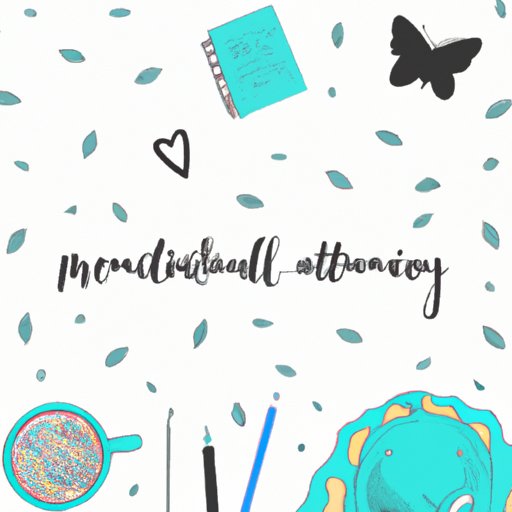
Introduction
Journaling is a practice that has been around for centuries. It involves writing down your thoughts, feelings, and experiences regularly. In recent years, journaling has gained a lot of attention for its therapeutic benefits. Specifically, it can be a powerful tool for improving mental health. In this article, we’ll explore the benefits of journaling for mental health and share practical tips and tools to get started.
Why Starting a Journal Can Benefit Your Mental Health and How to Begin
There are many reasons why writing in a journal can help with mental health. Some benefits include:
- Reducing stress and anxiety
- Improving mood and self-awareness
- Processing difficult emotions and experiences
- Providing a healthy outlet for thoughts and feelings
When starting a journal, it can be overwhelming to know where to begin. Here are some practical tips:
- Choose a journal you enjoy writing in
- Set aside a consistent time to write each day or week
- Decide on a format, such as bullet points, free-writing, or prompts
- Try to write for at least 10-15 minutes each session
6 Tips for Starting a Journaling Practice for Better Mental Health
Here are six tips to help you get started with journaling:
- Focus on your thoughts and feelings
- Aim for honesty and authenticity
- Don’t worry about grammar, spelling, or style
- Avoid self-judgment and criticism
- Experiment with a variety of formats and prompts
- Try to stay committed and make it a habit
How Journaling Can Help Manage Anxiety and Depression: A Beginner’s Guide
While journaling can benefit anyone, it can be especially helpful for those struggling with anxiety and depression. Here are some specific tips:
- Write about what triggers your anxiety or depression
- Keep track of mood changes over time
- Identify negative thought patterns and challenge them
- Brainstorm positive coping strategies
- Seek professional support if needed
The Science Behind Journaling for Mental Health
Research has shown that journaling can have a positive impact on mental health. For example, one study found that people who wrote about their emotional experiences for just 15-20 minutes a day experienced improved mood and less distress. However, journaling is not without potential risks, such as re-traumatization or exacerbating negative feelings. To minimize these risks, try to write about emotional experiences in small doses, balance negative experiences with positive ones, and seek professional support if needed.
Journaling Prompts for Mental and Emotional Healing
If you’re struggling to come up with topics to write about, here are some journaling prompts to consider:
- What am I grateful for today?
- What are my biggest fears and how can I face them?
- How have I grown since my last journal entry?
- What do I need to let go of to move forward?
- What did I learn from a recent challenge or setback?
- What are five things that always make me feel happy?
Remember, these are just suggestions. Feel free to create your own prompts based on your individual needs or interests.
How to Journal for Mental Health: A Step-by-Step Guide
If you’re looking for a more structured approach to journaling, consider trying a week-long or month-long plan that includes guidance on what to write, challenges to overcome, and tips for staying motivated. Here’s an example:
- Day 1: Introduce yourself to the journal, write about your goals and intentions for the month
- Day 2-4: Write freely about your emotions, experiences, and anything on your mind
- Day 5: Choose a prompt that challenges you to think differently or reflect on a positive experience
- Day 6: Write a letter to someone you’re grateful for or need to forgive
- Day 7: Reflect on your writing process, identify patterns, and set further intentions for the next week
Conclusion
Journaling can be a powerful tool for improving mental health. Whether you’re struggling with anxiety and depression or simply seeking a healthy outlet for your thoughts and feelings, starting a journaling practice can be incredibly beneficial. Remember, there’s no right or wrong way to journal. The most important thing is to start and make it a consistent habit. With time and self-reflection, you’ll see the therapeutic benefits of this transformative practice.




